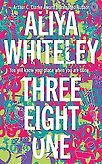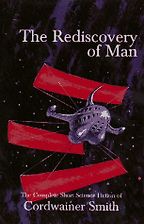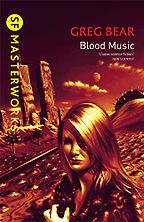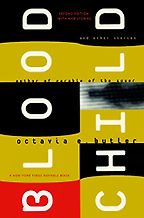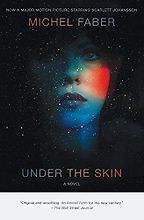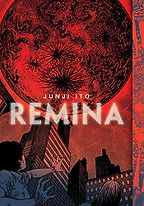How do the science fiction and horror book genres overlap? And can you explain the appeal of sci-fi horror, particularly body horror?
Mixing sci-fi and horror together goes back as far as sci-fi itself, maybe even beginning with Frankenstein. Through some of the books that I’m going to talk about today, I came to love the idea of exploring science fiction through the body, and through body horror in particular.
The appeal of body horror is the feeling of being both entranced and disgusted at the same time. It’s difficult to describe why that’s enjoyable, but you come across something that makes you feel strangely connected to being human. Sometimes science fiction can feel quite separate from the body, I think. For instance, there can be stories of space travel where humanity looks unchanged, in a way. I like it more when we get stuck in and get seriously altered, when it connects to the body and we think about what it means to be organic, to be alive and part of a science fictional universe.
That interests me because that’s going to have knock-on effects on the nature of being. What does it mean to be human and to be involved in science? Where might that take us in the future, or what effect can it have on us as living beings now? I think that’s a hugely exciting area to write about; certainly, it’s something I’ve been reading about for a long time.
Let’s jump into the recommendations. Your first is a short story called ‘A Planet Named Shayol,’ published in The Rediscovery of Man by Cordwainer Smith. Can you introduce us to this story?
It’s about a prison planet in the far, far future, when humanity has started traveling through the stars. This planet is one of the worst places you could possibly imagine. It’s a planet where humans start to grow extra limbs and organs, and those are then surgically removed from them and sent back via a donor process for organ transplantation. It is absolutely horrible.
It’s really the first time I can remember coming across sci-fi body horror, and I was fascinated. I would have been a late teenager when I read this story in an anthology. It stopped me in my tracks.
Cordwainer Smith is one of those writers who creates an amazing universe that’s incredibly vivid to the reader. He’s so imaginative. The idea of these extra fingers, toes, heads, limbs, and organs emerging from people in this terrible prison environment—I never forgot it. That’s why I chose this story.
“If you’re going to read all five of these books at once, make sure you take regular breaks!”
The strange thing is that when I first came across it in an anthology, I didn’t pay attention to who had written it. For many years, I’ve thought about it quite regularly as this example of something I found really upsetting and was entranced by: a nightmare of the future.
When you contacted me and asked me about the best science fiction horror writing, I thought: I would love to choose that story, but I can’t—I never found out who wrote it. But I asked around online, and somebody pointed me in the direction of Cordwainer Smith. It’s been only about two weeks that I’ve known the name of the story again. It’s been a lovely reconnection.
We’re proud to have played a part in that rediscovery! Your next recommendation is Blood Music, by Greg Bear. This was a finalist for both the Hugo and the Nebula Awards in 1985; can you tell us what you love about this science fiction horror book?
I think this is the most scientifically based of the five stories that I’ve picked. It’s very much in the tradition of Frankenstein, in that some of the book is taken up with the story of a scientist who’s pushing the boundaries of morality and experimenting with using the body in new and strange ways, but this time on a cellular level.
The first third of the book is connected to his journey. Then, we witness the effects of what he has unleashed and the way humanity is changed by what he’s done. I wouldn’t want to spoil it by giving too much away, but I remember reading it and being so fascinated by this vision of complete change for humanity and for the planet. It goes to some very surprising places.
The book was released in 1985, and we’re dealing with a scientist who’s working on the cusp of areas of exploration at that time. When Frankenstein was released, galvanism and the exploration of electricity through the body were at the forefront of experimentation. I wonder if Greg Bear was dealing with an area of cellular exploration that was popular at the time. He expands on themes of ‘what’s at the boundary of modern science understanding, and what could that lead to?’
Similarly, at the moment, we’re seeing some brilliant science fiction being written that addresses climate change. Quite often, whatever we feel is at the vanguard of what we’re trying to understand or deal with, as a problem or as an area of exploration, bleeds into the science fiction that’s being written.
That makes a lot of sense. Your next recommendation for us is Octavia Butler’s Bloodchild. Butler was a multi-time Hugo and Nebula winner, of course, and the first science fiction writer to win a MacArthur Fellowship. Can you introduce us to this haunting science fiction novella?
Octavia Butler is one of my favourite writers. She’s had a huge influence on me. She writes about humanity and what it would have to offer to other species, to other ways of living, and what we’re prepared to trade to make a deal within ourselves or with other civilizations, if we ever met them. She’s very interested in the cost of trying to live together in harmony.
Bloodchild is a novella. It imagines a future in which humanity is traveling through the stars and has ended up on a planet where other aliens are living. Part of the trade to live peacefully with them is that humans let the aliens implant their eggs in our bodies.
It’s sensitively written and incredibly thoughtful about what that might mean and whether we’d be capable of doing that. At the same time, it’s stomach-churning to read some of the descriptions. It’s upsetting stuff, but it’s amazing, in terms of intelligently asking: What are we capable of trading? What are we capable of giving away about ourselves and what would we most want to protect about ourselves?
So we’re getting to deep issues around identity and values, here.
Absolutely, and she never suggests that there would be a straightforward solution or that everybody would feel comfortable. Everybody, including the aliens, has their own thoughts and feelings about these intermingled and cooperative ways of life and how that’s going to play out. It’s never simplistic, and I love that about her work.
Butler was an amazingly dedicated person. She was determined to write science fiction and to write what she wanted to write, at a time when that was very difficult to do for her. What’s good about this collection, about Bloodchild and the other short stories, is that you get a little bit of her own voice at the end, where she describes why she wrote those stories and what they mean to her. There’s even a little bit at the back of the book about her personal writing methods, which is really interesting to read. As I said, I just think she’s amazing.
I would never argue with that! Your next recommendation for us is Under the Skin by Michel Faber. This was Faber’s debut novel and it won a Whitbread Award. Can you tell us why you love this sci-fi horror book?
It’s a book that’s set on Earth—right now, I would say—and it’s imagining that the aliens are already here but have been surgically altered to look like us. On their home planet, they look a bit more like sheep, so they feel that they have more of a bond to sheep than they do to us. And they bring their preconceptions to our world, about how we can’t be very intelligent or important because we’re hairless, two-legged weirdos.
It’s a brilliant reflection of our preconceptions about bodies, and what we think other forms of life may be capable of or how important we think they are, in terms of whether or not they look like us. The novel is written from the point of view of an alien who has a particular job to do, which involves rounding up humans (while trying to fly under the radar and go unnoticed), and then processing them for a particular use back on her home planet. It’s about her struggle to decide whether humans have thoughts and feelings, and if we’re worth trying to save in any way at all.
That’s wonderful. I think something about that flipped perspective lets us understand ourselves and how we treat other creatures much better than a direct exploration could.
Yes. I really love the way Faber uses language in the book to do this: the alien refers to people of her own kind as human, and to us as animals. It’s just a great reflection within the language of how they think; it’s so beautifully written throughout.
There is a film adaptation, which I really like, but it doesn’t go into why the alien is collecting these lonely hitchhiking humans. The book goes into much more depth that brings it into the category of sci-fi body horror for me. What possible use could we be to them if we’re considered such a lesser form of life? It’s quite hard to take in its final pages, but it opens your mind so well to looking at the situation in a different way.
Challenging our preconceptions of what otherness looks like, of how it might act, is a big part of my own work. I’ve imagined aliens in all sorts of ways. If you make them like us, a mirror of us, that raises its own questions. If you make them very different, as in Butler’s Bloodchild, where they’re giant insects, then that’s a new level of repulsion that the reader has to deal with. It’s a question of deciding to what extent you want the reader to feel connected to or separate from those beings, and then, how you can play with the distance you have from them.
As you just mentioned, much of your own work has contained elements of body horror, but you’ve got a new book coming out early next year that’s a little bit different—can you please tell us about that?
Three Eight One is a fantasy adventure. A young woman has to embark on a quest and discover herself, and some very strange, weird things happen on the way. That’s what usually happens in my books, so it’s no different in that regard. But this was an attempt to try something quite different: all the sections of the book are 381 words long.
That’s wonderful. How was it working under such a tight constraint?
I really enjoyed it. I was surprised that it started to come naturally to me at some point. I would just read the word count at the end of each section and think, ‘Oh, I’m about right.’ It was loads of fun to do.
I’m suitably impressed! Your last recommendation for us is Remina by Junji Ito. This is quite different from your previous selections; can you tell us what you appreciate about this book?
Junji Ito is a horror manga artist, so this is full-on body horror. When I read his books, I usually have to take a break at some point and put them down. I wouldn’t say he is necessarily a science fiction writer, but Remina is probably the closest he gets to that. I picked it because he plays with scale so amazingly well, in a way that feels like classic science fiction to me. This is not human body horror, but planetary body horror.
Remina is the name of a planet that is coming straight for Earth. It’s making a beeline for us in a very disturbing way. It’s wonderfully strange and organic. Remina is named after the daughter of the astronomer who first discovered it. As panic sets in on Earth and people start to think that something terrible is going to happen, groups of people all over the world decide that sacrificing the astronomer’s daughter might appease this weird giant planet god. I think this has more in common with Lovecraft, maybe.
It’s on a massive scale, and it’s so beautifully drawn and written. The sense of this planet hurtling towards us with its own agenda is incredibly scary. And the mayhem that breaks out on Earth is almost overwhelming. In deciding to tell this story as a graphic novel, he doesn’t give the reader any distance from what’s happening; you feel completely immersed within it.
I’ve noticed that when I read Junji Ito, I start by turning the pages quite slowly and really admiring all the beautiful work he’s done in drawing it. Then, I speed up because I become so involved. I’m just desperate to find out what happens next. And then, it’s almost like a comic strip effect, where I’m turning the pages so quickly that it almost seems to come to life. I love that effect in his work. But I do need to take breaks every now and again, because it can be overwhelming.
All the stories and novels I’ve recommended today are so vivid, so visual, so engaging and immersive, in terms of what it means to be human and what the body is capable of, and what can be done to bodies and envisaging futures around that. I would say if you’re going to read all five of these books at once, make sure you take regular breaks and rehydrate! I need to go away and read some fairly sedate books for a while now to get over that experience.
Interview by Uri Bram
December 11, 2023. Updated: November 29, 2024
Five Books aims to keep its book recommendations and interviews up to date. If you are the interviewee and would like to update your choice of books (or even just what you say about them) please email us at [email protected]
Five Books interviews are expensive to produce. If you've enjoyed this interview, please support us by donating a small amount.

